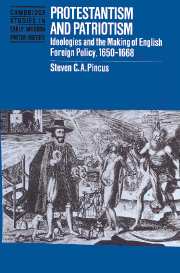Book contents
- Frontmatter
- Contents
- Acknowledgments
- List of abbreviations
- 1 Introduction
- Part I The rod of the Lord: ideology and the outbreak of the First Anglo-Dutch War
- Part II To unite against the common enemy: the 1654 Treaty of Westminster and the end of apocalyptic foreign policy
- 5 Historiographical overview
- 6 The causes of the war stated
- 7 Peace proposed
- 8 Political upheavals and ideological divisions
- 9 The rejection of apocalyptic foreign policy
- 10 The Protectorate's new foreign policy
- Part III Popery, trade, and universal monarchy: ideology and the outbreak of the Second Anglo-Dutch War
- Part IV The Medway, Breda, and the Triple Alliance: the collapse of Anglican Royalist Foreign Policy
- Conclusion
- Bibliography
- Index
- Titles in the series
6 - The causes of the war stated
Published online by Cambridge University Press: 01 October 2009
- Frontmatter
- Contents
- Acknowledgments
- List of abbreviations
- 1 Introduction
- Part I The rod of the Lord: ideology and the outbreak of the First Anglo-Dutch War
- Part II To unite against the common enemy: the 1654 Treaty of Westminster and the end of apocalyptic foreign policy
- 5 Historiographical overview
- 6 The causes of the war stated
- 7 Peace proposed
- 8 Political upheavals and ideological divisions
- 9 The rejection of apocalyptic foreign policy
- 10 The Protectorate's new foreign policy
- Part III Popery, trade, and universal monarchy: ideology and the outbreak of the Second Anglo-Dutch War
- Part IV The Medway, Breda, and the Triple Alliance: the collapse of Anglican Royalist Foreign Policy
- Conclusion
- Bibliography
- Index
- Titles in the series
Summary
Why, then, did the English think they were fighting their fellow Protestant republic from across the North Sea? How did they explain this conflict which had already taken on epic proportions in their imaginations?
There could be no question, argued Donald Lupton, that the “Dutch were the first offenders, so 'tis just and fitting on our parts to repulse the injuries and affronts offered us.” The war had its origin in “the wicked thoughts” of Admiral Van Tromp, who as “a vassal of the Orange family” was “by consequence a Cavalier in grain, and enemy to the Commonwealth of England.” The English were sure that the Dutch had taken on the cause of the despised Stuart family. The official Declaration of the Parliament catalogued a litany of Orangist-inspired Dutch actions in favor of the House of Stuart. English newspapers frequently reported naval cooperation between the Dutch fleet and Royalist pirates. One Dutchman was even reported to have said that “the rod is growing in Holland to revenge that innocent blood of the king.” A republican poet found “the Hogen of a royal mind / Inclin's to monarchy,” advising him to “beware / thou dost not put thy foot into a snare.“
Not surprisingly, the Dutch martial aim was thought to be the subversion of the English state. “The States of the Netherlands have proclaimed open wars against England,” reported the French Occurrences, “and utterly disown it for being a commonwealth.”
- Type
- Chapter
- Information
- Protestantism and PatriotismIdeologies and the Making of English Foreign Policy, 1650–1668, pp. 87 - 100Publisher: Cambridge University PressPrint publication year: 1996



